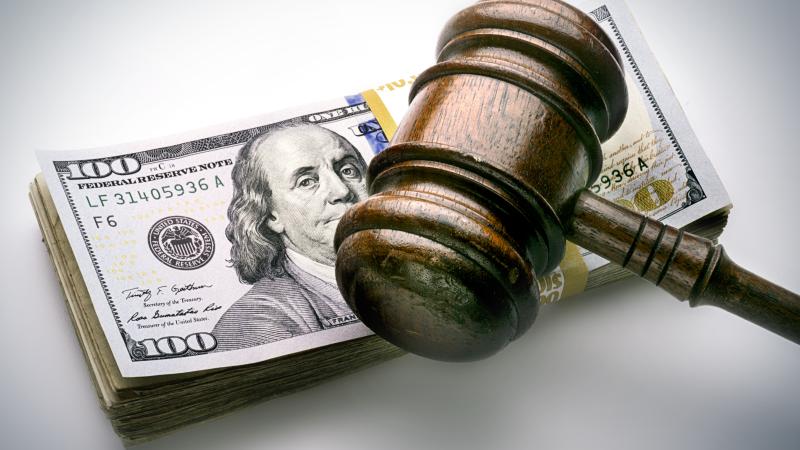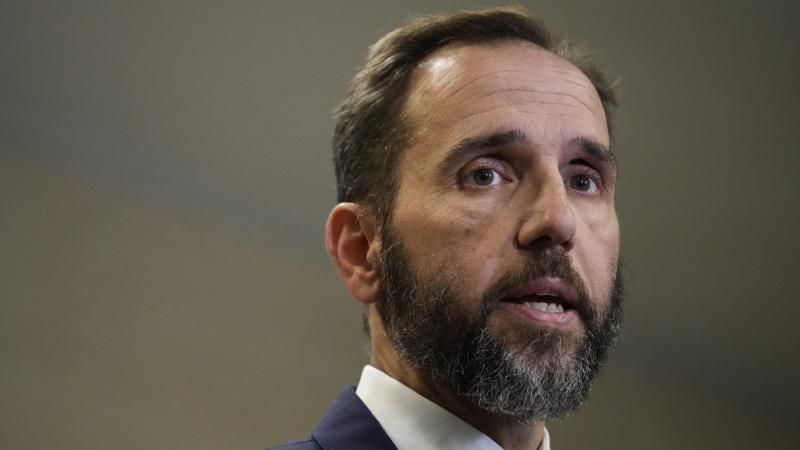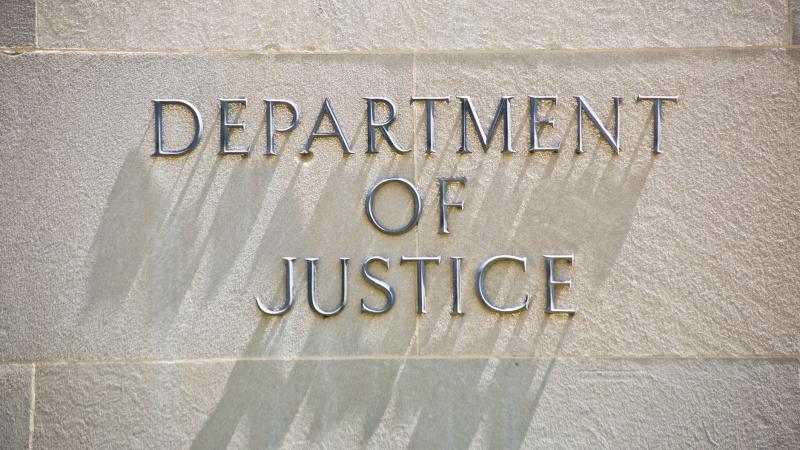Comey expected to work for 'President-elect Clinton,' knew top aide was talking to media: emails
Emails referenced in a bombshell court filing by acting U.S. Attorney Lindsey Halligan in which the government rejected Comey's argument that he was being maliciously prosecuted for providing false statements and obstructing Congress about actions he took as FBI director.
Federal prosecutors revealed Monday they have unearthed a trove of personal emails showing then-FBI Director James Comey openly talked in the days before the 2016 election that he expected to be working soon for President-elect Hillary Clinton and was being kept apprised by a top FBI aide on efforts to anonymously provide information to the news media.
"Well done my friend. Who knew this would. E [sic] so uh fun," Comey wrote in an early November 2016 email after then-FBI special government employee Dan Richman briefed the FBI director on Richman's efforts to provide information and guidance to The New York Times on an article involving Clinton's email scandal.
The emails were referenced in a bombshell court filing by acting U.S. Attorney Lindsey Halligan and her deputy, Tyler Lemmons in which the government rejected Comey's argument that he was being maliciously prosecuted for misleading Congress about actions he took as FBI director.
Halligan cited and attached to the filing numerous emails in which Comey was clearly aware that Richman was working to provide information anonymously to news outlets about the Clinton email case and that he expected those outreach efforts would end with Clinton defeating Donald Trump in the November 2016 election.
"Some day they will figure it out. And as [Individual 1 and Individual 2] point out, my decision will be one a president-elect Clinton will be very grateful for (although that wasn’t why I did it)," Comey wrote Richman in one such email in late October 2016.
Halligan's filing said the emails showed Comey was aware of and encouraging Richman's contacts with the media, contrary to his claims to Congress.
"Consistent with the above-described correspondence, Richman corresponded extensively with members of the media regarding or on behalf of the defendant, including in an anonymous capacity," the DOJ court filing argued.
You can read that filing here.
Comey is charged with making false statements and obstructing Congress concerning testimony in 2020 in which he stood by earlier 2017 testimony saying he did not approve of anonymous leaks to the news media on high-profile cases involving Clinton's emails and Donald Trump's now-debunked ties to a Russian plot to influence the election.
Richman, a former DOJ official and current Professor of Law at Columbia University Law School, was assisting the FBI during the 2016 election, and it is already public knowledge that Richman later assisted Comey by leaking the so-called “Comey Memos” to The New York Times in 2017 after Comey's firing by President Trump. Motivating the leak was Comey's desire to prompt the appointment of a special counsel to carry on the bureau’s Trump-Russia investigation, which proved to be baseless. Comey has described Richman as a “friend” to investigators, and Richman also went on to be Comey’s personal attorney.
Monday's court filing also raised the possibility that prosecutors will argue Comey misled Congress about another element of his testimony, this involving whether he was aware of a U.S. intelligence intercept in summer 2016 indicating Clinton had approved a plan to smear Trump with the Russia allegations.
The court filing revealed prosecutors have specific handwritten notes — which were hidden in a secret room at the FBI — indicating Comey was aware of the intelligence.
"The discovery of the handwritten notes is relevant considering the defendant’s prior testimony on September 30, 2020. Of note, during that hearing, the defendant was questioned by Senator Graham of South Carolina and Senator Hawley of Missouri," the filing noted. "The questions focused on whether the defendant remembered 'being taught' of 'U.S. presidential candidate Hillary Clinton’s approval of a plan concerning U.S. presidential candidate Donald Trump and Russian hackers hampering U.S. elections as a means of distracting the public from her use of a private email server.'
"The defendant responded by stating that 'it doesn’t ring any bells with me' and 'I don’t know what that refers to' and 'I don’t remember receiving anything that is described in that letter,'" the filing added. "Despite this testimony, the defendant’s handwritten notes dated September 26, 2016, read: 'HRC plan to tie Trump.'"
Richman previously admitted to agents in interviews that he routinely communicated on behalf of Comey, his longtime friend, with New York Times reporter Michael Schmidt, whose work was among the newspaper's 2018 Pulitzer-winning stories on Russian election interference. The goal, Richman told the FBI, was "to correct stories critical of Comey, the FBI and to shape future press coverage" outside the bureau's official press office, according to internal FBI memos.
"Richman was pretty sure he did not confirm the Classified Information. However, Richman told the interviewing agents he was sure 'with a discount' that he did not tell Schmidt about the Classified Information," one FBI memo recounted.
Comey made a public speech exonerating Clinton of criminality in July 2016, but alerted Congress in October 2016 that further Clinton emails had been found after the FBI searched a laptop belonging to disgraced former Democratic Rep. Anthony Weiner, then the husband of top Clinton aide Huma Abedin.
“After the defendant sent the October 2016 letter the defendant emailed extensively with Daniel Richman,” the DOJ said in its Monday court filing. “Much of the correspondence occurred via the defendant’s use of a personal email account and Mr. Richman’s use of an email account associated with Columbia University.”
“Make sure you keep your eyes shut. The country can’t seem to handle your finding stuff,” Richman wrote to Comey on Oct. 29, 2016. Comey replied: “Thanks for the battling you have done against unreason. This is a strange time. B[u]t we press on.”
The next day, Richman sent Comey an email about an opinion piece he had been asked to write for The New York Times about Comey’s letter to Congress. Richman stated that he was “not inclined” to “write something” but that he would “do it” if Comey thought it would “help things to explain that [Comey] owed [C]ong[ress] absolute candor” and that Comey’s “credibility w[ith] [C]ong[ress] w[ould] be particularly important in the coming years of threatened [C]ong[ress] investigations.”
“No need. At this point it would [be] shouting into the wind. Some day they will figure it out. And as [Individual 1 and Individual 2] point out, my decision will be one a president elect Clinton will be very grateful for (although that wasn’t why I did it),” Comey said in his Oct. 30, 2016 response back.
The DOJ said Monday that Comey “appears to have reconsidered that view shortly thereafter” and pointed to Comey’s lengthy email to Richman the next day.
“When I read the times [New York Times] coverage involving [Reporter 1], I am left with the sense that they don’t understand the significance of my having spoke about the case in July [2016]. It changes the entire analysis. Perhaps you can make him smarter,” Comey told Richman on Nov. 1, 2016. “Let’s imagine the Times had a policy against writing new articles close to elections if the articles might influence the election. Consistent with that policy they would avoid writing this week if sources told them that the FBI was looking at Huma Abedin’s emails. But let’s imagine that they wrote a very high profile piece in July that sources lead them to now conclude was materially inaccurate. Would they correct it or stay silent because they have a policy to avoid action near elections? I suspect they would quickly conclude that either course is an ‘action’ and the choices are either reporting or concealing but there is no longer a ‘neutral’ option because of the reporting in July. I also suspect they would resolve very quickly to choose the action of disclosing because to remain silent is to actively mislead, which has a wide range of very bad consequences.”
Comey added: “Why is this so hard for them to grasp? All the stuff about how we were allegedly careful not to take actions on cases involving other allegations about which we have never spoken is irrelevant. I love our practice of being inactive near elections. But inactivity was not an option here. The choices were act to reveal or act to conceal.”
Richman responded the next day, saying: “This is precisely the case I made to them and thought they understood. I was quite wrong. Indeed I went further and said mindless allegiance to the policy (and recognition that more evidence could come in) would have counseled silence in july to let hrc [Hillary Clinton] twist in the wind.”
Richman soon added, “Just got the point home to [Reporter 1]. Probably was rougher than u would have been.”
Comey then emailed Richman shortly thereafter, saying “pretty good” and sending a link to a New York Times piece about Comey’s alleged options in late October 2016 concerning the Clinton email investigation. Comey told Richman, “Someone showed some logic. I would paint the cons more darkly but not bad.” Richman then responded: “See I *can* teach.”
At Comey’s direction, records previously showed Richman allegedly spoke with the press to help shape news stories in Comey’s favor, although Richman has said Comey never asked him to talk to the press. FBI emails show that Richman was ostensibly working at the FBI for the Office of General Counsel under then-FBI general counsel James Baker, and that Richman was coordinating with Baker and with then-Comey chief of staff James Rybicki.
Internal FBI emails released through the Freedom of Information Act show that, while Richman signed a June 2015 acknowledgment related to his appointment to be a special government employee (SGE), his first term as an SGE appeared to have officially lapsed at the end of June 2016. The paperwork for Richman to re-sign to have him continue as an SGE does not appear to have been sent to Richman again until December 2016, and FBI emails indicate that Richman never actually signed it despite having been reappointed as an SGE in 2016. During this timeframe, Richman continued meeting with Comey and communicating with FBI officials. Comey’s friend resigned as an SGE in early February 2017.
Richman initially signed paperwork in 2015 acknowledging ethics guidelines which barred SGE's from misusing government information and from making non-public information public to further anyone’s private interests. He was also sent guidelines in January 2017 which said SGE's could not improperly leak government information for anyone’s private gain.
The Facts Inside Our Reporter's Notebook
Documents
File















